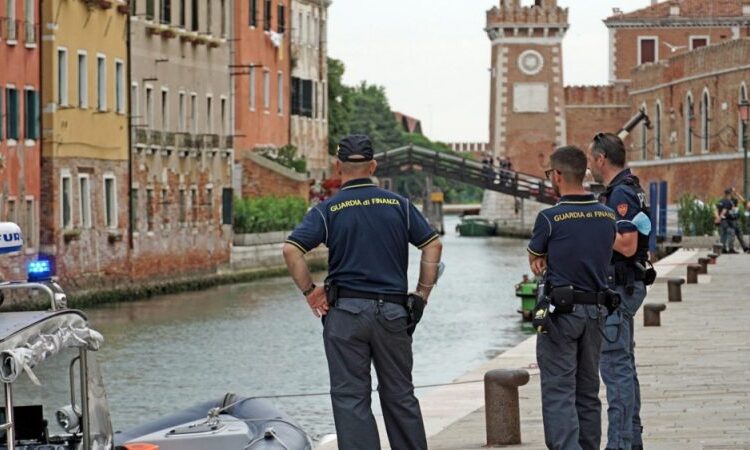
The European Public Prosecutor’s Office (EPPO) and the Italian financial police have jointly uncovered an international fraud scheme involving €600 million related to the Next Generation EU recovery fund, and extensive raids are underway across Italy, the EPPO said in a press release on Thursday (4 April).
Authorities suspect organised crime – though not of mafia origin – to be behind this elaborate scam, currently under investigation in Venice with collaboration from Slovak, Romanian, and Austrian police forces.
The Guardia di Finanza, Italy’s financial police, is actively executing precautionary measures against 24 individuals following a judicial order issued by the preliminary investigations judge of the Rome Tribunal, upon request from the European Delegated Prosecutor of the Venice Office.
The scale of the investigation is extensive: A team of 150 financial police officers is currently conducting searches across eight Italian regions, aided by specialised canine units trained to detect cash.
The funds for these projects were administered by Simest, a company owned by CDP, one of the main financial institutions controlled by the Italian state.
In a statement, Simest reported that it had actively cooperated with the authorities and in particular with the Guardia di Finanza (Finance Police) by reporting, to the extent of its competence – in the period between January 2022 and September 2023 – all suspicious requests received and subsequently found to be under investigation.
“The identification of these cases by Simest was possible thanks to precise and scrupulous analysis of the risk indicators detected on the basis of the system of controls adopted and strengthened. This evidence confirms Simest’s full and proactive cooperation with the authorities, as well as the adequacy and severity of the controls, thanks to the continuous strengthening of the controls and reports carried out to protect public funds,” the statement said.
However, many of the targeted 24 individuals have prior criminal records, indicating a sophisticated operation, the European Prosecutor for Italy, Andrea Venegoni, told a press conference in Venice following the announcement.
Preliminary findings, as stated in the EPPO press release, suggest that the entities seeking funding under the Recovery Fund primarily consist of small and medium-size companies aiming to expand their business activities to foreign markets.
According to the statement, “the suspects allegedly created and deposited false corporate balance sheets to show that the companies were active and profitable, whereas in fact they were non-active, fictitious companies”.
In the majority of cases, their main activity revolves around fabricating documents to fraudulently access the allocated funds, highlighting systemic vulnerabilities within the funding mechanism.
Substantial illicit profits have allegedly been laundered through a complex network of fictitious companies, strategically established in Austria, Slovakia, and Romania.
“This operation clearly demonstrates the positive synergy and collaboration between the European Prosecutor’s Office and the Guardia di Finanza”, Venegoni said, adding that this allows them both to investigate incidents outside their limited jurisdiction and have a more comprehensive overview.
Italy tops list of EU frauds
Just last month, the European Court of Auditors (ECA) warned of possible “irregularity or even corruption” in the spending of the pandemic recovery fund.
A few weeks before, a report published by the EPPO showed that Italy leads in terms of financial damage to the European budget, with a staggering 556 investigations initiated in 2023 into an estimated €6.02 billion of mismanaged funds.
The report, covering 19 countries, revealed that by the end of 2023, a total of 1,927 active investigations were ongoing, with the overall estimated damage to the EU budget of €19.2 billion.
Of this, 59% (€11.5 billion, corresponding to 339 investigations) is linked to serious cross-border VAT fraud. Such fraud often involves sophisticated criminal organisations and is nearly impossible to uncover from a purely national perspective.
The irregularities associated with the National Recovery and Resilience Plan have already taken a financial toll on Italy, costing the state €1.8 million, according to a report of the Italian General Prosecutor’s Office of the Court of Auditors presented on 13 February.
This figure is expected to rise significantly as spending progresses, with only 14.7% of the allocated funds (€28.1 billion) having been utilised so far, while more than 70% of resources have been earmarked.
[Edited by Charles Szumski/Zoran Radosavljevic]







